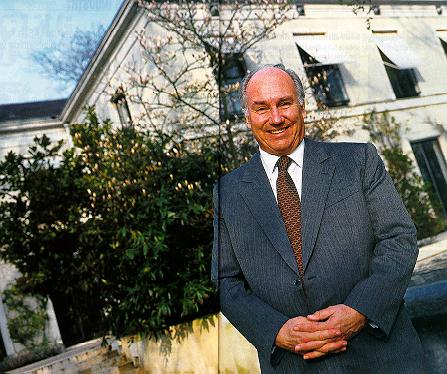An entrepreneur in the
poverty industry
By Pranay Gupte
Based in a nondescript building overlooking
Lake Geneva, the Aga Khan Foundation has
quietly become the world's second biggest
philanthropic foundation in international
development work, after the Ford Foundation
but well ahead of the Rockefeller and
MacArthur foundations.
Established in February 1967, the foundation's
mission is to focus on traditional third-world
issues such as alleviating hunger and poverty,
and on promoting productive employment and
modern technologies. Today the foundation
channels $85 million annually into some 120
grassroots programs in about a dozen
developing nations. These programs cover
health, education, rural development and
activities of nongovernmental organizations.
 From the beginning, Prince Karim insisted that
the foundation be completely
nondenominational, serving not only Ismaili
Muslims. Says Robert d'Arcy Shaw, a Briton
who serves as the foundation's general
manager: "Nondenominational means we're
concerned very much with two things: the
ability of people and groups to do things for
themselves and not to do it in isolation—we're
interested in the improvement of relationships
between local groups over time."
From the beginning, Prince Karim insisted that
the foundation be completely
nondenominational, serving not only Ismaili
Muslims. Says Robert d'Arcy Shaw, a Briton
who serves as the foundation's general
manager: "Nondenominational means we're
concerned very much with two things: the
ability of people and groups to do things for
themselves and not to do it in isolation—we're
interested in the improvement of relationships
between local groups over time."
Through the foundation, the Aga Khan is taking
a leading role in reenergizing the development
debate. The development industry has run out
of ideas. Those huge U.N. conferences on
"sustainable development" are usually just
expensive gabfests and opportunities for the
delegates to do some shopping. Watching this,
the taxpayers in donor countries such as the
U.S. are getting fed up with cries of poverty;
there is no sense that significant progress has
been achieved despite massive infusions of aid
($48 billion in 1997 from 22 members of the
Organisation for Economic Cooperation and
Development).
While the poverty business has created lots of
good jobs for international bureaucrats, the
Aga Khan Foundation is run by a professional
staff of just ten people, fewer than a decade
ago. All grassroots projects are handled
entirely by local people, with strict monitoring
by the foundation's representatives so that
there's little waste and no corruption—the
banes of other international development
programs.
The Aga Khan says he's planning to emphasize
job creation; helping third-world labor markets
respond positively in an era of globalization;
private-sector assisted health programs for the
poor; enhancing agricultural productivity. But
not in isolation. General Manager Shaw: "Much
of this can't be directed by the state. That's
passé. We have the opportunity of working
with more grassroots and international
organizations in a coordinated way—bringing to
bear their skills and their resources. That, to
me, is the biggest challenge of all at the
moment for us."
Courtesy Forbes, 31 May 1999
Back to Timeline 1999
 From the beginning, Prince Karim insisted that
the foundation be completely
nondenominational, serving not only Ismaili
Muslims. Says Robert d'Arcy Shaw, a Briton
who serves as the foundation's general
manager: "Nondenominational means we're
concerned very much with two things: the
ability of people and groups to do things for
themselves and not to do it in isolation—we're
interested in the improvement of relationships
between local groups over time."
From the beginning, Prince Karim insisted that
the foundation be completely
nondenominational, serving not only Ismaili
Muslims. Says Robert d'Arcy Shaw, a Briton
who serves as the foundation's general
manager: "Nondenominational means we're
concerned very much with two things: the
ability of people and groups to do things for
themselves and not to do it in isolation—we're
interested in the improvement of relationships
between local groups over time."